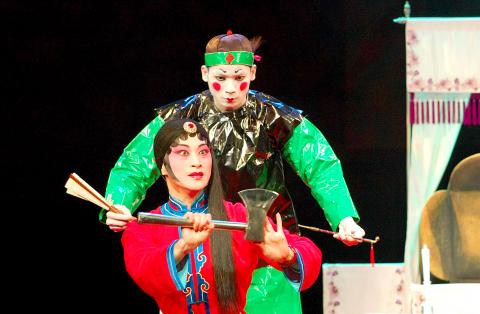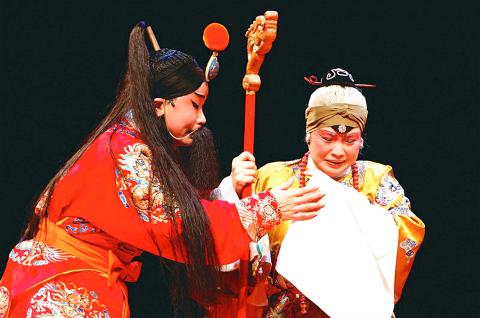Times change, regimes change and the reasons why a book, a play or an opera was once banned or considered taboo now seem quaint, if not ridiculous. Yet at one time or another, several popular Beijing operas have fallen afoul of the censors in China and Taiwan.
Thirteen years ago, National Guoguang Opera Company (國立國光劇團) staged a “Forbidden Show” that was such a success, artistic director Wang An-chi (王安祈) decided to create a mini-festival of once-banned works (or excerpts from them) as a way of celebrating the right to free speech and the vitality of art that survives despite censorship and oppression.
The See You Again, Banned Operas (再見禁戲) program features nine works. The idea behind the program title is twofold: one, that such banned operas can be seen again; two, that in today’s world, the rationale for banning these works, or making performances of them taboo, is “no longer seen.”

Photo courtesy of National Guoguang Opera Company
The program opens tonight with The Lucky Purse (鎖麟囊) at 7:30pm. The opera was banned in China in 1950 because it tells the story of a wealthy bride who gives away the lucky purse her mother bestowed on her to a poor bride, whom she encounters on her way to her groom’s home.
This raised issues about class and whether a poor person should accept gifts from the wealthy.
Tomorrow’s matinee will be two pieces from the popular Yang Family Generals (楊家將) collection of stories: Si Lang Seeks His Mother (四郎探母) and Women Generals of the Yang Family (楊門女將).

Photo courtesy of National Guoguang Opera Company
The first was banned both in China and by the authoritarian-era government in Taiwan — the former because the main character was deemed a traitor for surrendering and marrying an enemy princess, and the latter because the government feared homesick Mainlander soldiers might be upset.
The second opera was banned in China because women were considered unfit to be generals and could not be counted upon to save a nation.
Sunday’s matinee will be a performance of Li Huiniang (李慧娘), a kun (崑) opera derived from Red Plum Pavilion (紅梅閣), which Chinese Communist Party censors banned because it is a ghost story, which smacked of superstition.
Friday next week will see excerpts from the kun opera The Tale of the Wooden Hairpin (荊釵記) and The Western Chamber (西廂記). The first, one of the “four great southern operas” (四大南戲), was banned during the early Qing Dynasty.
On Saturday next week, Lin Chong’s Night Escape (林沖夜奔) and Wild Boar Forest (野豬林) will be performed. The Taiwanese government banned the first one during the Martial Law era.
The final show in the program will be on Sunday next week, featuring Zhao Jun Departs for Barbarian Lands (昭君出塞), Zhuangzi Tests His Wife (莊子試妻 — 大劈棺) Wu Han Kills His Wife (吳漢殺妻). These were banned in China because the first was seen as satirizing the government, the second as “obstructing good customs” and the third because killing one’s wife was a “violation of social education.”
The lengths of performances vary, but will run between 140 and 185 minutes, including an intermission.
■ Tonight at 7:30pm, tomorrow and Sunday at 2:30pm, Friday next week at 7:30pm, Saturday and Sunday next week at 2:30pm
■ Taiwan Traditional Theatre Center’s Main Theater (臺灣戲曲中心大表演廳), 751, Wenlin Rd, Taipei City (台北市文林路751號)
■ Tickets are NT$400 to NT$1,500, available at the National Theater Concert Hall’s box offices, online at www.artsticket.com and convenience store ticket kiosks

May 18 to May 24 Pastor Yang Hsu’s (楊煦) congregation was shocked upon seeing the land he chose to build his orphanage. It was surrounded by mountains on three sides, and the only way to access it was to cross a river by foot. The soil was poor due to runoff, and large rocks strewn across the plot prevented much from growing. In addition, there was no running water or electricity. But it was all Yang could afford. He and his Indigenous Atayal wife Lin Feng-ying (林鳳英) had already been caring for 24 orphans in their home, and they were in

President William Lai (賴清德) yesterday delivered an address marking the first anniversary of his presidency. In the speech, Lai affirmed Taiwan’s global role in technology, trade and security. He announced economic and national security initiatives, and emphasized democratic values and cross-party cooperation. The following is the full text of his speech: Yesterday, outside of Beida Elementary School in New Taipei City’s Sanxia District (三峽), there was a major traffic accident that, sadly, claimed several lives and resulted in multiple injuries. The Executive Yuan immediately formed a task force, and last night I personally visited the victims in hospital. Central government agencies and the

Australia’s ABC last week published a piece on the recall campaign. The article emphasized the divisions in Taiwanese society and blamed the recall for worsening them. It quotes a supporter of the Taiwan People’s Party (TPP) as saying “I’m 43 years old, born and raised here, and I’ve never seen the country this divided in my entire life.” Apparently, as an adult, she slept through the post-election violence in 2000 and 2004 by the Chinese Nationalist Party (KMT), the veiled coup threats by the military when Chen Shui-bian (陳水扁) became president, the 2006 Red Shirt protests against him ginned up by

As with most of northern Thailand’s Chinese Nationalist Party (KMT) settlements, the village of Arunothai was only given a Thai name once the Thai government began in the 1970s to assert control over the border region and initiate a decades-long process of political integration. The village’s original name, bestowed by its Yunnanese founders when they first settled the valley in the late 1960s, was a Chinese name, Dagudi (大谷地), which literally translates as “a place for threshing rice.” At that time, these village founders did not know how permanent their settlement would be. Most of Arunothai’s first generation were soldiers